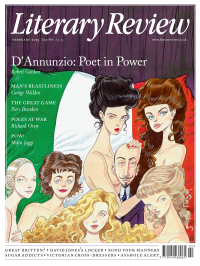Malcolm Forbes
Coming a Cropper
Harvest
By Jim Crace
Picador 272pp £16.99
It is the end of harvest for a small, tight-knit community who depend on the land to survive. The poor yield should be their prime concern but one night the local manor house is set on fire, its haylofts and stables burnt out. The farmhands who ‘reap and gossip’ are immediately suspicious of three outsiders – two men and one beguiling woman. Master Kent, landowner and de facto magistrate, exacts swift retribution by sentencing both men to a week in the pillory. But the village’s harmony is threatened again with the arrival of Edmund Jordan, Kent’s cousin and the rightful owner of the land, and his no-nonsense plans for ‘Progress and Prosperity’. Faced with persecution or ruin, it isn’t long before the residents flee, leaving our narrator, Walter Thirsk, to make sense of the chaos of a disintegrating society, the turmoil of change, and the overhaul of the only reality he knows.
Harvest is Jim Crace’s most ambitious novel since Being Dead (1999), but thematically it belongs among those offerings set in mythical lands and distant, hazy pasts. His debut, Continent, explored a seventh landform, while Six took us to a mysterious city that refused to be pinned down to one name. The village at the centre of Harvest is known simply as ‘The Village’ and is surrounded by ‘The Land’. In a sense it feels like a microcosm of the rapidly imploding America on show in The Pesthouse (2007), Crace’s tenth novel, its inhabitants aware of their imminent destruction and scrabbling for a fresh start and safer sanctuary. The difference this time around is Crace’s stunning depiction of country life in all its hardship – less Tolstoy, more Hardy, but bleak-pastoral rather than idyllic-bucolic, and even further from the madding crowd.
Crace spreads his trauma, allowing the rot to set in gently. Kent is ‘in such narrows’ that selling off his land could be his only means of staying afloat. Catching wind of this, his former manservant Thirsk panics. Harvests have been ‘niggardly’ for some time now, and whole livelihoods are at stake. When Mr Quill, the master’s chart-maker, appears with his charts to see the lay of the land, and refers ominously to the future as ‘hereafter’, tongues start wagging; but it is Jordan’s entrance that truly shatters the serenity and, simultaneously, brings Crace’s narrative roaring to life. Unlike the fair and rational Kent, ‘an even-handed, subtle Caesar’, Jordan is the cruel usurper and every inch the villain, hunting down miscreants, incarcerating women for witchery and, worst of all, ruthlessly pursuing his grand design of enclosing the fields. ‘The sheaf is giving way to sheep,’ Thirsk muses. Kent voices his unease more forcibly: ‘I fear his harvesting. I think he means to shear us all, then turn us into mutton.’
As ever, Crace is unflinching in his portrayal of barren landscapes and tarnished hopes. When the elements don’t scorch or freeze the victims of the pillory then ravenous pigs will attack them. But Harvest isn’t all desolate and Crace knows exactly when to filter chinks of light through his black clouds. His lyrical prose renders the sunnier rustic interludes supremely evocative: ‘The awns and whiskers of the barley’s ears were brittle and dry enough to chit-chat-chit every time they were disturbed, nattering with ten thousand voices at every effort of the wind or every scarper of a rabbit, mouse or bird.’ Early scenes hint at a kind of prelapsarian innocence, and Thirsk remembers when ‘We were like sun-drenched butterflies and then we were like moon-struck moths.’ In addition, Crace authenticates his history by sprinkling his narrative with sparkling mica-like archaisms and quaint dialectal variations – ruddocks and dunnocks pick at grain, damsons are scrumped, mushrooms taste reasty.
In fiction such rural recreation is too often overtly twee or flowery but Crace strikes the right balance. He also takes a risk by imbuing the book with all things harvest. Thus a shaven head is ‘stubbled’, stars ‘have ripened’ and after a day in the fields lovers go to bed and find their consolations ‘sowing seed’. We could play Crace at his own game and call this corny but it is actually a neatly executed trick. In a lesser writer’s hands it would be metaphor-straining, but for Crace, an expert one, it is simply metaphor-stretching.
Harvest is a mesmerising slow-burner of a novel, both a paean to a lost way of life and a timeless cautionary fable. ‘There is another world clear of the forest tops,’ Thirsk tells himself, ‘a world beyond the rule of seasons, a redrawn world, as Mr Quill has said, where there are “hereafters”.’ We gladly accompany Thirsk on his eventful seven-day journey of discovery, always aware of that one portentous word which slyly reappears as a leitmotif, signifying a better future beyond the village boundary, a word in which Jim Crace cleverly compounds his perennial twin concerns of place and time: hereafter.

Sign Up to our newsletter
Receive free articles, highlights from the archive, news, details of prizes, and much more.@Lit_Review
Follow Literary Review on Twitter
Twitter Feed
How to ruin a film - a short guide by @TWHodgkinson:
Thomas W Hodgkinson - There Was No Sorcerer
Thomas W Hodgkinson: There Was No Sorcerer - Box Office Poison: Hollywood’s Story in a Century of Flops by Tim Robey
literaryreview.co.uk
How to ruin a film - a short guide by @TWHodgkinson:
Thomas W Hodgkinson - There Was No Sorcerer
Thomas W Hodgkinson: There Was No Sorcerer - Box Office Poison: Hollywood’s Story in a Century of Flops by Tim Robey
literaryreview.co.uk
Give the gift that lasts all year with a subscription to Literary Review. Save up to 35% on the cover price when you visit us at https://literaryreview.co.uk/subscribe and enter the code 'XMAS24'